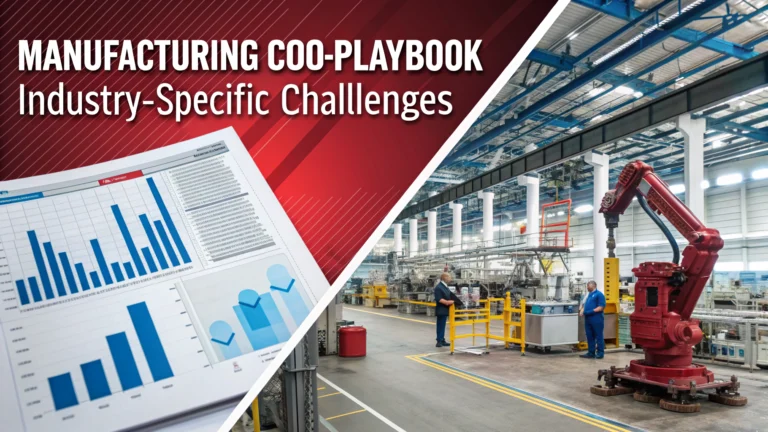Manufacturing Chief Operating Officers (COOs) face unique challenges in overseeing complex production operations while maintaining efficiency, quality, and profitability.
This guide addresses the specific obstacles manufacturing COOs encounter and provides practical solutions to optimize operations and drive sustainable growth.
Whether managing supply chain disruptions, implementing automation, or developing workforce strategies, manufacturing COOs need a structured approach to navigate industry-specific demands.
Supply Chain Management
- Monitor supplier performance metrics
- Develop alternative sourcing strategies
- Implement real-time inventory tracking systems
- Create risk mitigation plans for supply disruptions
- Build strong relationships with key suppliers
Quality Control & Compliance
Establish comprehensive quality management systems (QMS) that align with ISO 9001 standards and industry regulations.
- Regular quality audits
- Employee training programs
- Documentation procedures
- Defect tracking systems
Technology Integration
Select and implement appropriate manufacturing execution systems (MES) to optimize production processes.
- Industrial IoT sensors
- Predictive maintenance software
- Production scheduling tools
- Data analytics platforms
Workforce Management
Develop strategies to address skilled labor shortages and maintain high productivity levels.
| Challenge | Solution |
|---|---|
| Skills Gap | Apprenticeship programs |
| Employee Retention | Career development paths |
| Safety Compliance | Regular training sessions |
Cost Management
Implement cost reduction initiatives while maintaining product quality.
- Energy efficiency programs
- Waste reduction strategies
- Process optimization
- Automation opportunities
Performance Metrics
Track essential KPIs to measure operational effectiveness:
- Overall Equipment Effectiveness (OEE)
- First Pass Yield (FPY)
- Manufacturing Cycle Time
- Inventory Turnover
- Customer Satisfaction Rates
Risk Management
Create comprehensive risk assessment and mitigation strategies.
- Cybersecurity protocols
- Environmental compliance
- Safety procedures
- Business continuity plans
Next Steps for Manufacturing COOs
Start by assessing current operations against industry benchmarks to identify improvement areas.
Contact industry associations like the National Association of Manufacturers for additional resources and networking opportunities.
Consider working with manufacturing consultants to develop tailored solutions for specific operational challenges.
Continuous Improvement Programs
Establish structured methodologies for ongoing operational enhancement:
- Six Sigma initiatives
- Lean manufacturing practices
- Kaizen events
- Value stream mapping
Sustainability Initiatives
Implement environmentally responsible manufacturing practices:
- Carbon footprint reduction
- Renewable energy adoption
- Sustainable packaging solutions
- Water conservation measures
Innovation Management
Foster a culture of innovation throughout the manufacturing process:
Research & Development
- New product development
- Process improvements
- Material innovations
Technology Adoption
- 3D printing integration
- Advanced robotics
- AI-powered solutions
Driving Manufacturing Excellence
Manufacturing COOs must balance multiple priorities while steering their organizations toward operational excellence. Success requires a comprehensive approach that combines strategic planning, technology adoption, and people management.
- Regularly evaluate and update operational strategies
- Invest in workforce development and technology
- Maintain focus on quality and customer satisfaction
- Build resilient and adaptable operations
By implementing these strategies and maintaining a forward-thinking approach, manufacturing COOs can position their organizations for sustainable growth and competitive advantage in an evolving industrial landscape.
FAQs
- What are the primary responsibilities of a Manufacturing Chief Operating Officer (COO)?
A Manufacturing COO oversees daily operations, develops operational strategies, manages supply chain logistics, ensures quality control, oversees production efficiency, implements safety protocols, and coordinates between different departments while reporting to the CEO. - How does a Manufacturing COO address supply chain disruptions?
They implement risk management strategies, develop multiple supplier relationships, maintain safety stock levels, utilize predictive analytics, and create contingency plans while monitoring global supply chain trends and potential disruptions. - What role does a Manufacturing COO play in digital transformation?
The COO leads Industry 4.0 initiatives, implements smart manufacturing technologies, oversees automation integration, manages data analytics implementation, and ensures digital systems are effectively integrated across operations. - How do Manufacturing COOs manage quality control and compliance?
They establish quality management systems, ensure ISO compliance, implement Six Sigma methodologies, maintain regulatory compliance, conduct regular audits, and oversee quality improvement initiatives. - What strategies do Manufacturing COOs use to optimize production efficiency?
They implement lean manufacturing principles, utilize OEE (Overall Equipment Effectiveness) metrics, optimize workflow processes, reduce waste, implement preventive maintenance programs, and balance production capacity with demand. - How does a Manufacturing COO address workforce challenges?
They develop training programs, implement succession planning, address skill gaps, manage labor relations, ensure workplace safety, and create strategies for recruiting and retaining skilled workers. - What sustainability initiatives fall under a Manufacturing COO’s responsibility?
They oversee environmental compliance, implement energy-efficient processes, manage waste reduction programs, develop sustainable sourcing strategies, and ensure environmental impact minimization across operations. - How do Manufacturing COOs handle cost management and operational budgeting?
They analyze operational costs, implement cost-reduction initiatives, manage capital expenditure, optimize resource allocation, control inventory costs, and develop budgets aligned with company objectives. - What role does data analytics play in a Manufacturing COO’s decision-making process?
They utilize data analytics for demand forecasting, production planning, quality control, predictive maintenance, supply chain optimization, and performance monitoring to make informed operational decisions. - How do Manufacturing COOs ensure effective crisis management?
They develop emergency response plans, establish business continuity procedures, maintain communication protocols, conduct risk assessments, and create recovery strategies for various potential disruptions.
